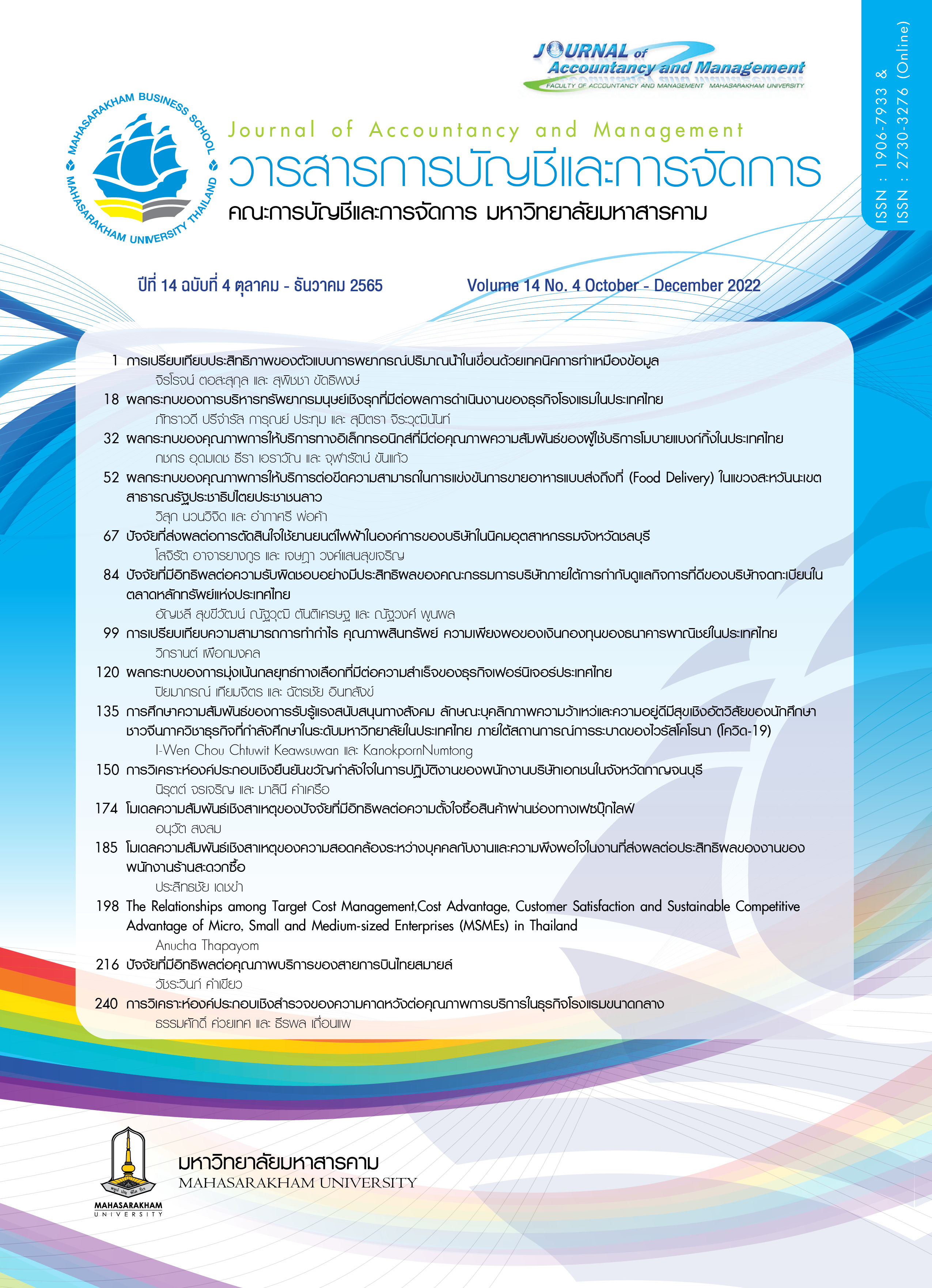ปัจจัยที่มีอิทธิพลต่อความรับผิดชอบอย่างมีประสิทธิผลของคณะกรรมการบริษัทภายใต้การกำกับดูแลกิจการที่ดีของบริษัทจดทะเบียนในตลาดหลักทรัพย์แห่งประเทศไทย
Main Article Content
บทคัดย่อ
การวิจัยครั้งนี้มีวัตถุประสงค์ เพื่อศึกษาถึงปัจจัยที่มีอิทธิพลต่อความรับผิดชอบอย่างมีประสิทธิผลของคณะกรรมการบริษัท ซึ่งเป็นองค์ประกอบหนึ่งของการกำกับดูแลกิจการทีดี อันประกอบด้วยปัจจัย 4 ประการ ได้แก่ การสนับสนุนของผู้บริหารระดับสูง ศักยภาพของระบบเทคโนโลยีสารสนเทศ แรงกดดันจากการแข่งขัน และแรงผลักดันจากหน่วยงานกำกับดูแล โดยใช้แบบสอบถามเป็นเครื่องมือในการเก็บรวบรวมข้อมูลจากผู้บริหารของบริษัทจดทะเบียนในตลาดหลักทรัพย์แห่งประเทศไทย จำนวน 143 แห่ง สถิติที่ใช้ในการวิเคราะห์ข้อมูล ได้แก่ ค่าสัมประสิทธิ์สหสัมพันธ์ของเพียร์สัน และใช้การวิเคราะห์การถดถอยพหุคูณในการทดสอบสมมติฐาน ผลการวิจัยพบว่า ศักยภาพของระบบเทคโนโลยีสารสนเทศ แรงกดดันจากการแข่งขัน และแรงผลักดันจากหน่วยงานกำกับดูแล มีอิทธิพลเชิงบวกอย่างมีนัยสำคัญทางสถิติต่อความรับผิดชอบอย่างมีประสิทธิผลของคณะกรรมการบริษัทภายใต้การกำกับดูแลกิจการที่ดีของบริษัทจดทะเบียนในตลาดหลักทรัพย์แห่งประเทศไทย แต่การสนับสนุนของผู้บริหารระดับสูงไม่มีผลกระทบต่อความรับผิดชอบอย่างมีประสิทธิผลของคณะกรรมการบริษัท ผลการวิจัยในครั้งนี้ เป็นข้อมูลให้เห็นถึงแนวทางในการพัฒนาการกำกับดูแลกิจการด้านความรับผิดชอบของคณะกรรมการบริษัทให้มีประสิทธิผล ด้วยการพัฒนาศักยภาพของระบบเทคโนโลยีสารสนเทศของกิจการ การตอบสนองแรงกดดันจากการแข่งขัน และแรงผลักดันจากหน่วยงานกำกับดูแลที่เกี่ยวข้อง
Downloads
Article Details

อนุญาตภายใต้เงื่อนไข Creative Commons Attribution-NonCommercial-NoDerivatives 4.0 International License.
บทความที่ได้รับการตีพิมพ์เป็นลิขสิทธิ์ของวารสารการบัญชีและการจัดการ
ข้อความที่ปรากฏในบทความแต่ละเรื่องในวารสารวิชาการเล่มนี้เป็นความคิดเห็นส่วนตัวของผู้เขียนแต่ละท่านไม่เกี่ยวข้องกับมหาวิทยาลัยมหาสารคาม และคณาจารย์ท่านอื่นๆในมหาวิทยาลัยฯ แต่อย่างใด ความรับผิดชอบองค์ประกอบทั้งหมดของบทความแต่ละเรื่องเป็นของผู้เขียนแต่ละท่าน หากมีความผิดพลาดใดๆ ผู้เขียนแต่ละท่านจะรับผิดชอบบทความของตนเองแต่ผู้เดียว
เอกสารอ้างอิง
ตลาดหลักทรัพย์แห่งประเทศไทย. (2561). รายชื่อบริษัทจดทะเบียนในตลาดหลักทรัพย์. ค้นเมื่อ 21 มกราคม 2561. จาก https://www.set.or.th
พจนารถ ฤทธิเดช ปาริชาติ บูรพาศิริวัฒน์ และมัทนชัย สุทธิพันธ์. (2564). อิทธิพลของผลตอบแทนผู้บริหารต่อผลการดำเนินงานทางการเงินของบริษัทที่จดทะเบียนในตลาดหลักทรัพย์แห่งประเทศไทย. วารสารคณะการบัญชีและการจัดการ, 13(2), 1–15.
สำนักงานคณะกรรมการกำกับหลักทรัพย์และตลาดหลักทรัพย์. (2563). การกำกับดูแลกิจการที่ดี. ค้นเมื่อ 21 ตุลาคม 2564. จาก https://www.sec.or.th
Aaker, D. A., Kumar, V., & Day, G. S. (2001). Marketing research. (7th ed.). In N. Y. J. W. & Sons. (Ed.), New York : John Wiley & Sons.
Abdul Wahab, N. S., Ntim, C. G., Mohd Adnan, M. M., & Tye, W. L. (2018). Top management team heterogeneity, governance changes and book-tax differences. Journal of International Accounting, Auditing and Taxation, 32(August), 30–46.
Andes, S. L., Nuzula, N. F., & Worokinasih, S. (2020). Competitive Advantage as Mediating Factor for Creating Firm Value: A Literature Review. BISNIS & BIROKRASI: Jurnal Ilmu Administrasi Dan Organisasi, 27(1).
Anjaria, K. (2022). Knowledge derivation from Likert scale using Z-numbers. Information Sciences, 590, 234–252.
Assunção, R. R., De Luca, M. M. M., & De Vasconcelos, A. C. (2017). Complexity and corporate governance: An analysis of companies listed on the BM&FBOVESPA. Revista Contabilidade e Financas, 28(74), 213–228.
Darma, J., Susanto, A., Mulyani, S., & Suprijadi, J. (2018). The role of top management support in the quality of financial accounting information systems. Journal of Applied Economic Sciences, 13(4), 1009–1020.
De Villiers, C. & Dimes, R. (2021). Determinants, mechanisms and consequences of corporate governance reporting: a research framework. Journal of Management and Governance, 25(1), 7–26.
Erna, H. (2020). Business Strategy, Corporate Governance and Sustainability Reporting:An Analysis of the Fit Contingency Approach. Journal of Asian Finance, Economics and Business, 7(12), 761–771.
Fatima, S., Ishtiaq, M., & Javed, A. (2020). Impact of accounting information system on corporate governance: evidence from Pakistani textile sector. International Journal of Law and Management, 63(4), 431–442.
Gutterman, A. S. (2011). Corporate Governance and Sustainability. Sustainability and Corporate Governance, 16(June), 1–14.
Hair, F., Hopkins, L., Georgia, M., & College, S. (2014). Partial least squares structural equation modeling ( PLS-SEM ) An emerging tool in business research. European Business Review, 26(2), 106–121.
Hitesh Shukla, & Nailesh Limbasiya. (2015). Board Effectiveness: An Evaluation based on Corporate Governance Score. Think India, 18(1), 16–23.
Kaufman, B. E. (2015). Market competition, HRM, and firm performance: The conventional paradigm critiqued and reformulated. Human Resource Management Review, 25(1), 107–125.
Kurzeja, J., & Novak, J. (2017). Corporate governance quality and a firm’s adaptation to competitive threats. Finance a Uver - Czech Journal of Economics and Finance, 67(1), 53–78.
Laoworapong, M., Supattarakul, S., & Swierczek, F. W. (2015). Corporate Governance , Board Effectiveness , and Performance of Thai Listed Firms. AU Journal Management, 13(1), 25–40.
Luciano, M. M., Nahrgang, J. D., & Shropshire, C. (2020). Strategic leadership systems: Viewing top management teams and boards of directors from a multiteam systems perspective. Academy of Management Review, 45(3), 675–701.
Mocanu, M. (2010). Corporate governance in the banking industry. Academy of Economic Studies Bucharest. 9(3), 379–402.
Nordberg, D. & Booth, R. (2019). Evaluating the effectiveness of corporate boards. Corporate Governance (Bingley), 19(2), 372–387.
Nunnally, J. C. (1978). Psychometric theory. New York : McGraw-Hill.
Pastor, C. K. (2020). The Role of Management Information System: Review on the Importance of Data and Implementation in Organizational Process. SSRN Electronic Journal, 2(2), 1–5.
Sarhan, A. A. & Ntim, C. G. (2018). Firm- and country-level antecedents of corporate governance compliance and disclosure in MENA countries. Managerial Auditing Journal, 33(6–7), 558–585.
Silapamahabandit, K. & Hensawang, S. (2020). The Relationship between Corporate Governance and Firm Value of Listed Companies on The Stock Exchange of Thailand in SET100 Index. Journal of Accountancy and Management, 9(4), 1–14.
Yermack, D. (2017). Corporate governance and blockchains. Review of Finance, 21(1), 7–31.
Yusliza, M. Y., Norazmi, N. A., Jabbour, C. J. C., Fernando, Y., Fawehinmi, O., & Seles, B. M. R. P. (2019). Top management commitment, corporate social responsibility and green human resource management: A Malaysian study. Benchmarking, 26(6), 2051–2078.


